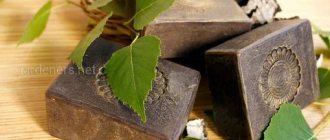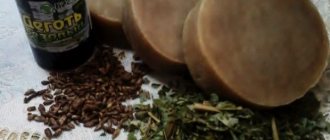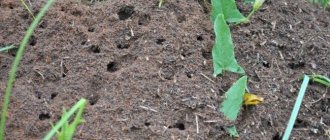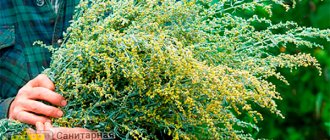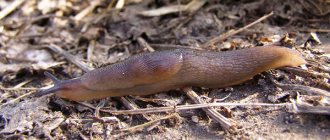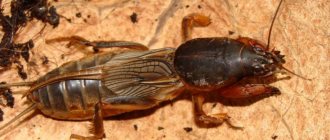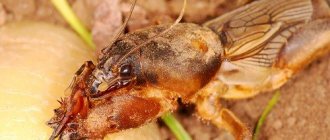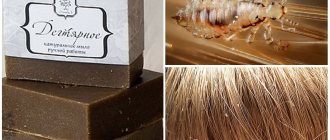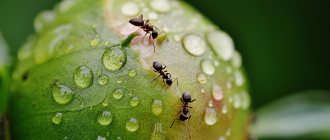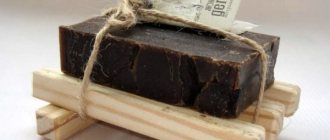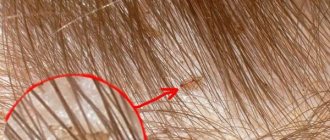Tar soap is a real godsend for gardeners who like to use natural products in their household that do not contain chemical components. It is effectively used for various purposes, including the destruction of harmful insects.
Tar soap will help in the fight against ants. The illustration for the article is used under a standard license ©ofazende.ru 868 The composition of tar soap includes birch tar, due to which the prepared solution becomes a natural, safe and effective insecticidal agent. The product has a pungent and pungent aroma and is known for its antiparasitic and antiseptic properties, which helps control pests. At the same time, it should be noted that for such purposes it is necessary to use only natural solid soap that does not contain various impurities and aromatic fragrances.
So, we get rid of ants and aphids using tar soap.
What kind of soap is there anyway?
For the garden we use three types of soap. Most often, ordinary household items. However, there are other options - tar and green.
- Laundry soap, or Marseilles soap , is cheap and cheerful: if it gets on insects, it leads to their death. It has antibacterial and antifungal properties, contains fatty acids (no more than 76%) and free alkalis (pH 11-12).
- Tar soap - soap with birch tar (up to 10%). This is a milder product with less alkali and a higher fatty acid content. The main application is cosmetology, as an antiseptic, regenerating and medicinal product.
- Green or potassium soap is sold in specialized stores for treating plants. It consists of water, natural fats, vegetable oils and potassium salts of fatty acids (hence the second name of soap - potassium). Sold in the form of a gel or spray. Can be used immediately to treat plants. The spray does not require preparation or dilution. The gel is diluted in water.
BUT, not all advice from the Internet on using soap in the garden can be used. So, let’s look at the use of laundry soap, as the most popular and affordable one, in a summer cottage. Where it should be used and where not.
Why is tar soap used in the garden?
Tar soap for plants is used in two ways:
- Watering at the root. Solutions are applied directly to the soil to destroy pests in the upper layers of the soil.
- Spraying. Homemade infusions are used to treat crops leaf by leaf to eliminate insects and their larvae on the green parts of plants.
Tar soap can be used in the garden against gastropods, aphids, beetles and butterfly larvae. In all cases, the product brings a good effect and helps get rid of insects.
When using tar soap for watering, you need to stick to small concentrations so as not to burn the roots of the plants.
Soap - as the basis and component of natural pest repellents
To combat harmful insects, in particular aphids, soap-based solutions are used. In this case, soap in its pure form is used as an insecticide, in combination with other natural insecticides (tansy, garlic, wormwood, pepper, etc.) as an adhesive.
We present you simple but working options:
A simple recipe for an insecticidal solution based on aphid soap
Homemade insecticidal soap is as effective as ready-made preparations, but costs significantly less.
Dilute 50 ml of ordinary (or the cheapest) liquid soap into 4 liters of water.
You can add a little denatured alcohol (technical alcohol) to the solution, but this is not at all necessary. Although many summer residents advise doing this.
Mix soap, water and alcohol (optional), pour the mixture into a sprayer and spray the plants.
Treatment against aphids is carried out in the early morning, evening or on a cloudy but not rainy day. Treatments are repeated as necessary.
Recipe for a soap-tobacco solution against aphids and other garden pests
Boil half a kilo of tobacco leaves in 2 liters of water. Strain, add 50 grams of laundry soap and dilute the solution in a bucket of water. Spray.
Treating elderberries with soapy water against aphids
Recipe for soap-tomato-onion infusion against cabbage aphids and other pests
It takes 2 days to prepare.
Days 1 and 2. Let half a kilo of onion peels steep in 2 liters of water for 2 days. Add another 2 liters of water and liquid soap to the finished infusion.
Day 2. Brew 2 kg of tomato trimmings (leaves and shoots) with 5 liters of boiling water. Leave the infusion for 2-4 hours, then boil, strain and dilute with water in a ratio of 1 to 2.
Day 2. Mix 2 solutions and treat the plants.
Using laundry soap against spider mites
Spider mites cause most trouble to owners of greenhouses with indoor plants and in greenhouses.
At the first manifestations: take a sponge and soap it with regular laundry soap. Treat the plants with this soap solution (all green parts - stems, leaves, buds). After a day, carefully rinse the remaining soap from the plant.
If you treated plants with indoor flowers, then first cover the pot with soil with film. Try not to let the soap get into the ground.
Outdoors, simply hose off the plants.
Using laundry soap against mealyworms
Another scourge of greenhouse growers! This is the worst of all the bad things.
Dissolve 30 grams of laundry soap in a liter of water and apply the solution with a sponge to the plants and soil in pots. Rinse off the solution after 4-5 hours. After a week, inspect the plants and repeat the treatment. If it doesn’t help, then there’s only chemistry!
Using soap solutions on berry bushes
Soap-mustard infusion against gooseberry moth and sawflies
Infuse 100 g of mustard in 10 liters of water for 2 days. Strain and dilute in half, add 40 g of laundry soap (for every 10 liters of solution).
The same infusion can protect fruit trees from codling moth caterpillars and leaf-eating caterpillars (treat the trees 15–20 days after flowering), and will also help get rid of aphids, bedbugs, and thrips.
Treating currants with soapy water
Pros and cons of tar soap
Tar soap as an insecticide has its advantages and disadvantages. The advantages of the product include:
- safety - tar soap does not harm plants and humans;
- lack of resistance - even if you constantly spray crops with a homemade solution, insects will not develop resistance to it;
- affordable price;
- ease of preparation;
- protective effect - tar soap prevents re-infestation by insects for several weeks.
At the same time, the product has certain disadvantages:
- strong unpleasant odor;
- allergenicity - before using the product you need to make sure there is no intolerance;
- negative impact on beneficial insects - tar soap repels not only pests, but also bees;
- mild effect - the product does not kill parasites, but only forces them to leave the attacked plants.
It is not recommended to use tar soap against pests in the country during the fruiting period of crops. If you spray a home remedy on a ripening crop, it will acquire an unpleasant odor and a bitter taste.
Laundry soap for caterpillars
Caterpillars are the scourge of crops such as cabbage. Every year, summer residents spend a huge amount of time trying to defeat them. BUT THEY ARE BACK!
Recipe for a soap solution with chamomile to combat caterpillars
A bucket of warm water, 1 kg of green chamomile and 50 grams of grated soap. Mix, strain and process.
Infusion of tar soap and ash
A glass of ash, a teaspoon of tar shampoo and 5 liters of water. Let the solution sit for a day and can be sprayed.
What pests are tar soap used in the garden?
Tar soap is a universal remedy and helps get rid of most pests in the garden. Most often, solutions are used to repel several parasites.
From aphids
Aphids are one of the most dangerous pests and cause damage to both vegetable and garden crops. Small insects stick to the leaves of plants in large colonies and suck the juices out of them within a matter of days.
Tar soap against aphids is used in the form of sprays. The treatment helps drive pests off the leaves and prevents them from returning for several weeks.
Tar soap forms a film on the leaf blades and prevents aphids from feeding on plant juices
Tar soap forms a film on the leaf blades and prevents aphids from feeding on plant juices
Against the Colorado potato beetle
The use of tar soap in the garden is in demand when crops are damaged by the Colorado potato beetle. Usually the product is used like this: dissolve a small bar in a bucket of warm water and spray the plants generously. You can also first collect pests by hand or wash them off the leaves with a low-pressure stream of liquid, and then treat them with soap.
The home remedy forms a thin protective film on the stems and plates of plants. This layer does not interfere with the processes of photosynthesis and air exchange, but repels pests. The Colorado potato beetle does not like the pungent smell of tar soap and cannot gnaw through plant leaves after treatment, so it quickly leaves the garden.
Attention! You need to start spraying vegetable crops at a time when there are still not very many pests on the bushes, and they have not had time to cause much damage to the plantings.
It is recommended to treat plants against the Colorado potato beetle in both dry and rainy weather.
From ants
Ants in general do not belong to the category of pests, but their presence in the garden is considered undesirable. Insects contribute to the spread of aphids throughout plants, and also feed on crop leaves if they are already damaged by parasites.
Tar soap helps get rid of ants. It can be used to spray plants, but the best effect is obtained when treating anthills. Tar soap is mixed with baking soda and garlic, diluted with water and watered abundantly over insect buildings. The method is considered gentle - the ants do not die, but are forced to leave the site.
Ants on the site pose a particular danger to fruit and berry crops
How to clean the inside of polycarbonate?
Polycarbonate
The panels can be washed well with warm (not boiling water) water and soap; for wiping it is better to use a soft cloth or a soft sponge. Also, dishwashing detergents do a good job of cleaning the panels (make sure it is low acid).
Interesting materials:
What is the geographical location of the tundra? What ISO should I set? What quality should bed linen be? Which quality is better 4k or HDR? Which video quality is better HD or 4K? What is the sound quality via Bluetooth? How many lumens are enough for a projector? How many cars are there in the train? What is the leaf arrangement of birch? What is the maximum pressure in household sinks?
What is birch tar used against - use in gardening and horticulture
Birch tar has a strong odor that insects with a well-developed sense of smell do not like. Its smell makes mole crickets, mice and moles leave. By treating the soil with tar, the smell will last for more than a month, preventing pests from entering the area.
Tar works as a repellent against flies, Colorado potato beetles, moths and sawflies. The product has a shorter shelf life on rodents and requires several treatments. The weakest effect is on adult weevils and ants. To get rid of these insects, spraying with tar is combined with other means.
Action against aphids and ants
Tar soap has become widespread in cosmetology. Girls actively use this product to prepare face and hair masks. But tar soap is also an indispensable assistant in the garden. It consists of ordinary soap with the addition of birch tar. It is due to the last component that it is possible to remove aphids and ants from the area.
You can try using salt. which everyone has in their home, but how to pour salt solution on onions for the best result is indicated here. As you know, ants are the helpers of aphids. They are the ones who can carry aphids from one place to another. So, when starting to fight against parasites, you need to take care of eliminating all existing anthills. But how to use laundry soap against aphids on an apple tree, and what you should pay attention to, is indicated in this article.
The peculiarity of tar soap is its unpleasant and pungent odor. This is precisely what repels insects that cannot stand such a “pleasant” aroma and leave the area.
Features of using tar soap
Gardeners know that to get complete relief from pests, they need to use tar soap, taking into account several features:
- Purchase it without any additives.
To learn the composition, there should be nothing except a soap base and birch tar.
- Grind using a grater.
It is allowed to cut into cubes of 2 - 3 centimeters with a knife.
- Combine with the right ingredients in strict proportions.
- Fill with warm water.
Note: a piece, even finely grated, will not completely dissolve in cold water.
Using soap against aphids
Most garden plants face aphid attacks during the summer season.
Treatment of bushes with products containing tar must follow special rules:
- The leaves are sprayed with the prepared solution.
- Part of the substance flows into the roots.
- The stems are processed.
Recipe against aphids with ash:
Take:
- Water – 8 liters.
- Ash – 500 grams.
- Garlic – 30 grams.
- Tar soap – 1 piece.
Good to know! The garlic is peeled and crushed as much as possible. Afterwards it is mixed with ash and placed in water. Next, you need to add a crushed bar of soap to the composition. After 3–4 hours, the solution must be filtered and the damaged bushes treated.
Using soap against ants
It is difficult to cope with ants, since the pests remain undetected for a long time, but at the same time they multiply quickly and actively damage plants and crops.
You need to use tar soap against such insects according to the following rules:
- Pour the prepared solutions into anthills.
- Spray damaged bushes with products.
- Treat leaves and stems.
Recipe against ants with soda. For preparation you need:
- Soda – 25 grams.
- Crushed piece of tar soap - 25 grams.
- Water – 2 liters.
You need to mix the ingredients and add water. It is allowed to add 5 – 10 grams of garlic to the composition.
Tips and tricks
All products against aphids and insects are used exclusively in their cooled form. To treat small trees and bushes, it is advisable to use a spray bottle. Before starting work, it is advisable to filter the solution and rinse the garden sprayer. If large particles get inside the mechanism, failure is possible.
To clean tomatoes, eggplants and other small plants from pests, all you need is a small broom that needs to be dipped in the prepared solution. This method is convenient for spraying low-growing fruit crops.
In addition, a mixture of 4 pieces of ground soap and warm water will be a good remedy against ants. Then add carbolic acid and a little kerosene to the bucket. As a result, the insects will quickly disappear. This tool makes it possible to get rid of ants on the site in an extremely short time.
Disadvantages of birch tar
Birch tar is harmless to humans. It is not poisonous, but is so odorous that it makes pests run away. But the same smell causes discomfort in people. Tar repels not only harmful, but also beneficial insects and therefore its use should be treated carefully and carefully. It should be borne in mind that the solution should not get on fruits and berries, otherwise their taste will deteriorate. The treatment is carried out carefully; if the mixture gets on clothes, it will not be possible to wash it.
Recently also searched:
How to use tar soap to protect plants
When using infusions based on tar soap against pests, you must adhere to certain rules.
- Repeat spraying of garden and vegetable crops once every 1-2 weeks. If there are a lot of insects on the leaves, plants are treated with tar soap against pests every 2-3 days until the parasites disappear.
- Spraying should be done in warm but sunny weather. It is best to process crops before noon or after sunset. Otherwise, the sun's rays may leave burns on wet leaves.
- You need to spray soap solutions over plantings in calm weather. Otherwise, the insecticidal suspension will be carried away from the plants, and the treatment will be ineffective.
It is not customary to combine tar soap against garden pests with chemical agents. Industrial solutions should be used separately in cases where homemade infusions do not produce results.
Attention! The advantage of home remedies is that, while highly effective, they remain safe and can be used at almost any stage of the growing season.
